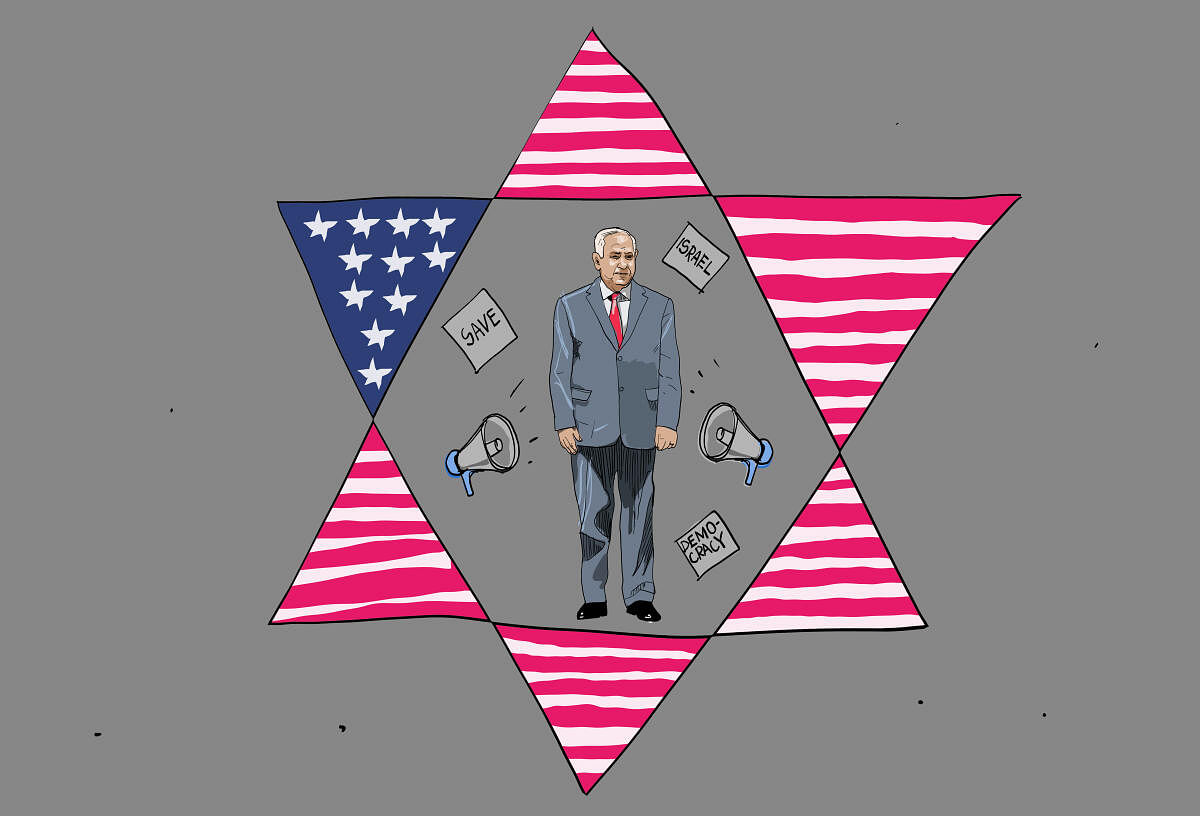
In the 48 hours before Prime Minister Benjamin Netanyahu reluctantly delayed his effort to overhaul the Israeli judiciary, his government was bombarded by warnings from the Biden administration that he was imperilling Israel’s reputation as the true democracy at the heart of the Middle East.
In a statement on Sunday night, soon after Netanyahu fired his defence minister because he had broken with the government on the judicial overhaul, the White House noted that President Joe Biden had told Netanyahu by phone a week ago that democratic values “have always been, and must remain, a https://www.deccanherald.com/opinion/first-edit/a-win-for-israeli-democracy-for-now-1204504.htmhallmark of the US-Israel relationship.” Major changes to the system, Biden said, must only “be pursued with the broadest possible base of popular support.”
Also Read | A win for Israeli democracy. For now
The statement was striking because in normal times, the standard line for a White House — whether Democratic or Republican — is that Washington does not interfere in the internal politics of its allies.
That has never truly been the case; it interferes all the time, usually behind the scenes. But in this case, Biden and his advisers dropped all pretenses, putting themselves publicly at odds with Netanyahu, even though he cast himself in conversations with administration officials as a man desperately looking for compromise.
In private, administration officials said, the conversations with Netanyahu’s government were even more blunt, indicating that Israel’s image as the sole democracy in the Middle East was at stake.
The US ambassador to Israel, Thomas R Nides, who has deep roots in the Democratic Party that go back to the Clinton administration, spent the weekend passing along messages from Biden and his staff. Brett McGurk, the top Middle East official in the White House, who has worked for both Democratic and Republican presidents, was in frequent contact with the Israeli ambassador to the US, Michael Herzog.
By Sunday night, White House officials came to two conclusions. The first was that Netanyahu had deeply miscalculated when he announced the firing of the defence minister, Yoav Gallant, who had publicly called for suspending efforts to pass the legislation that would alter how judges are appointed.
The second conclusion, they said, was that Netanyahu was looking for a way out of the crisis, and benefited from telling the right-wing partners in his fragile coalition that he could not risk losing the support of Israel’s most important ally. His message, one senior official said, was that Israel could soon face a crisis with Iran, which is creeping ever closer to a nuclear weapons capability, and that he could not afford to alienate Washington.
So when Netanyahu announced on Monday in Israel that “when there is a possibility of preventing a civil war through dialogue,” he would “take a time out for dialogue,” they read it as a message to the far-right members of his coalition that he had no other choice.
Netanyahu put himself in an impossible bind, one senior official said, telling US officials and the Israeli public that he was looking for compromise, and yet trying to hold together the right-wing coalition members whom he needs to remain in power — and who refused to back down.
At the crux of the dispute was a fundamental argument about the nature of democracy, involving changes Netanyahu had never before seemed particularly passionate about — but was forced to back to keep his right-wing coalition together.
He insisted that stripping the Israeli Supreme Court of the power to overrule laws passed by Israel’s parliament, the Knesset, was necessary to promote true democracy — even though he had to put that effort on hold a week ago. And the changes to how judges were appointed, and to make it more difficult to remove a prime minister, seemed to many critics to place unchecked power in the hands of the government.
The proposed overhaul also came as Netanyahu is standing trial on corruption charges, and some feared he could use the changes to extract himself from his legal troubles.
Biden’s team, though, also had a more immediate concern. There was an acute awareness, one official said, that Netanyahu is expected to arrive in Washington this week for Biden’s second Summit for Democracy. One senior official said the consensus was that it would have been deeply uncomfortable to have Netanyahu speak while hundreds of thousands of Israelis were protesting that he was dismantling checks on his government’s power.
John Kirby, a spokesperson for the White House’s National Security Council, told reporters on Monday that Biden was “very, very forthright with Prime Minister Netanyahu” that democracies “are strengthened by the whole idea of checks and balances, as well as the fact that any fundamental change to a democratic system really ought to be pursued with the broadest possible base of popular support.”
But late Monday, as news that Netanyahu had backed away spread in Washington, the question turned to how long the Israeli leader could last. His reputation for political acumen and the ability to press for compromise had been tarnished, several officials said. The chances that his fragile, bare majority would hold seemed
slim. And the prime minister had not
resolved the issue as much as kicked it down the road.